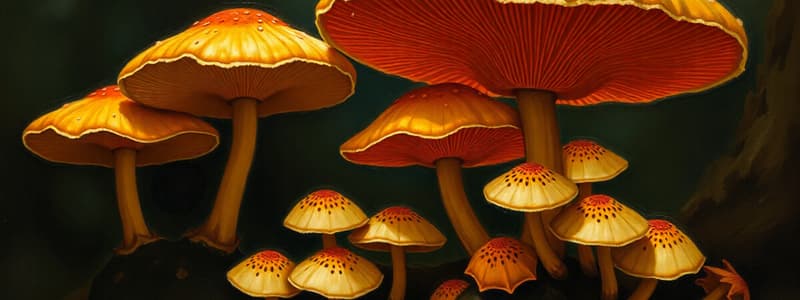Podcast
Questions and Answers
Which group of individuals faces a higher risk of psychosis or suicide when using psilocybin?
Which group of individuals faces a higher risk of psychosis or suicide when using psilocybin?
- Individuals with anxiety disorders
- Individuals with a history of depression
- Individuals with a history of psychosis or bipolar disorder (correct)
- Individuals with no prior mental health issues
What is the general long-term risk associated with psilocybin use?
What is the general long-term risk associated with psilocybin use?
- Moderate long-term risk of health issues
- Little long-term risk (correct)
- Severe long-term risk for all users
- High long-term risk of addiction
What type of disorder is specifically mentioned as increasing the risk of adverse effects when using psilocybin?
What type of disorder is specifically mentioned as increasing the risk of adverse effects when using psilocybin?
- Bipolar disorder (correct)
- Personality disorders
- Obsessive-compulsive disorder
- Eating disorders
Which clinical consideration is essential for individuals using psilocybin with a mental health history?
Which clinical consideration is essential for individuals using psilocybin with a mental health history?
What is one potential effect of psilocybin on individuals with a history of psychosis?
What is one potential effect of psilocybin on individuals with a history of psychosis?
What is the chemical name for psilocybin?
What is the chemical name for psilocybin?
Which of the following is NOT a street name for psilocybin?
Which of the following is NOT a street name for psilocybin?
Where can psilocybin commonly be found?
Where can psilocybin commonly be found?
Which demographic is least likely to have ever used psilocybin?
Which demographic is least likely to have ever used psilocybin?
What correlation was found regarding psilocybin use and education?
What correlation was found regarding psilocybin use and education?
What percentage of U.S. adults reported lifetime use of psilocybin according to recent studies?
What percentage of U.S. adults reported lifetime use of psilocybin according to recent studies?
What type of mushrooms are primarily associated with psilocybin?
What type of mushrooms are primarily associated with psilocybin?
In which context was psilocybin historically used by indigenous people?
In which context was psilocybin historically used by indigenous people?
What is a common physical side effect of psilocybin use?
What is a common physical side effect of psilocybin use?
Which group reportedly has the highest risk for lifetime psilocybin use?
Which group reportedly has the highest risk for lifetime psilocybin use?
What effect can psilocybin have on an individual's perception?
What effect can psilocybin have on an individual's perception?
What is one potential psychological effect of taking psilocybin?
What is one potential psychological effect of taking psilocybin?
What long-term risk is associated with psilocybin use?
What long-term risk is associated with psilocybin use?
What could increase the likelihood of a person using psilocybin?
What could increase the likelihood of a person using psilocybin?
Which of the following is a short-term effect of psilocybin?
Which of the following is a short-term effect of psilocybin?
What might psilocybin users experience as a result of its use?
What might psilocybin users experience as a result of its use?
Flashcards are hidden until you start studying
Study Notes
Psilocybin: What it is and its origins
- Psilocybin, commonly known as "magic mushrooms," is a psychoactive substance found in certain types of mushrooms (psilocybe mushrooms).
- Psilocybin mushrooms grow naturally in various regions across the globe, with evidence of use dating back to 3000 B.C. by indigenous communities in Central America for spiritual and healing purposes.
- Common street names include "magic mushrooms," "shrooms," and "mushrooms."
- It's consumed in dried or powdered forms.
Psilocybin Use and Prevalence
- Around 9.68% of U.S. adults have reported using psilocybin at some point in their lives.
- Use patterns vary across racial and ethnic groups, with African Americans, Hispanics, and other mixed individuals less likely to report lifetime use compared to non-Hispanic white individuals.
- Psilocybin is particularly prevalent among college students, especially Hispanic college students.
- Individuals who have used LSD, methamphetamine, or heroin are more likely to have also tried psilocybin.
- Individuals who use marijuana are 22 times more likely to have used psilocybin.
- Increased education attainment is associated with higher lifetime use, especially among college graduates.
- Individuals who report their health as "good" or "fair/poor" are less likely to have used psilocybin.
- Individuals who identify as bisexual are at the highest risk for lifetime use, followed closely by gay and lesbian individuals.
- Minority groups may be at higher risk due to societal pressures and using psilocybin as a coping mechanism for stress.
Physical and Psychological Effects of Psilocybin
- Physical effects are typically felt within 20 minutes and can last up to 6 hours.
- Physical side effects include nausea, vomiting, muscle weakness, drowsiness, lack of coordination, increased blood pressure, and increased heart rate.
- Other physical side effects include numbness, especially in the face, dry mouth, sweating, high body temperature, loss of urinary control, and muscle weakness.
- Psilocybin alters perception of reality, often causing visual and auditory hallucinations, synesthesia, altered perception of time and space, and a dreamlike/euphoric state.
- Users may experience a sense of inflated well-being, a distorted sense of self, and may experience visions or reliving memories.
- Psilocybin can induce feelings of anxiety, paranoia, and psychosis.
- Users occasionally experience a "bad trip" characterized by extreme fear, anxiety, panic, and paranoia.
Long-Term Risks of Psilocybin Use
- While long-term risks are typically low, individuals with pre-existing mental health conditions such as psychosis or bipolar disorder are at a higher risk for psychosis or suicide.
Studying That Suits You
Use AI to generate personalized quizzes and flashcards to suit your learning preferences.



